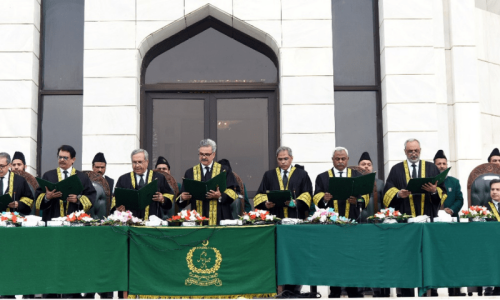An annular solar eclipse, said to be the last big celestial event of the year as it comes to a close, descended upon parts of Pakistan on Thursday morning.
Starting at 7:30am, it peaked at 8:37am and is to go on till 1:06pm. The eclipse was also viewed in other countries including Myanmar, Indonesia, the United Arab Emirates and parts of India.

Special or 'Kusoof' prayers were offered in various mosques including Faisal Mosque in Islamabad.
The Pakistan Meteorological Department had said the eclipse would be visible all over Pakistan, especially in Karachi and Gwadar. It said the celestial event would be visible in eastern Europe, northern and western Australia, eastern Africa, Pacific Ocean and Indian Ocean, and much of Asia, including Pakistan.
People have been advised not to look at the sun with the naked eye during the eclipse because it may cause permanent eye damage or even blindness.
The Met Department shared the duration of the eclipse in various cities of Pakistan:
- Karachi Start of partial eclipse: 7:34; Maximum eclipse: 8:46; End of partial eclipse: 10:10
- Lahore Start of partial eclipse: 7:47; Maximum eclipse: 8:58; End of partial eclipse: 10:19
- Islamabad Start of partial eclipse: 7:50; Maximum eclipse: 8:57; End of partial eclipse: 10:15
- Peshawar Start of partial eclipse: 7:49; Maximum eclipse: 8:56; End of partial eclipse: 10:13
- Quetta Start of partial eclipse: 7:39; Maximum eclipse: 8:48; End of partial eclipse: 10:08
- Gilgit Start of partial eclipse: 7:55; Maximum eclipse: 9:01; End of partial eclipse: 10:16
- Muzaffarabad Start of partial eclipse: 7:51; Maximum eclipse: 8:59; End of partial eclipse: 10:16

The solar eclipse is not a total eclipse but an annular one. This means the sun and the moon will be positioned in a way to form a "ring of fire" as the moon won’t be able to completely cover the sun. Hence its edges will be illuminated.
The rare and historic event is completely different from the total solar eclipse that took place in August 1999 due to the 'albedo effect'. It means that most of the radiation did not reach the ground and got deflected back into space because of cloudy skies previously. But this time there are clear skies. Therefore, there will be a direct impact of the radiation. People have been advised not to look at the sun with the naked eye during the eclipse.
Safety during eclipse

Khaleej Times shared information regarding safety during an eclipse:
- "Don't ever look at the sun without proper eye protection
- Don't view the sun through sunglasses of any type (single or multiple pairs), or filters made from photographic film, or any combination of photographic filters, crossed polarisers or gelatin filters, CDs, CD-ROMs, or smoked glass. None of these are safe
- Don't fit any filter to a telescope without first checking it thoroughly for damage. If it is scuffed, scratched, has pinholes in it, or you have any other doubts about it at all, don't use it"
Superstitions associated with celestial event

There are several superstitions being associated with the celestial event. Some say it may bring about major changes in world politics with shifts in power.
Other beliefs include thoughts of fear. In ancient China, people used to counter the effects of a solar eclipse by getting together and screaming aloud. They believed that there was a big snake eating up the moon which needed to be stopped and scared away with the noise.

Some believe expectant mothers should not go out when there is a solar eclipse and to stay away from sharp objects. Pregnant animals such as livestock are also brought indoors at such times.
There is also a belief that there are stage germs unleashed during a solar eclipse so all eatables are also kept covered or in the fridge.
Some countries announce a public holiday on such occasions.
People associate life and death with solar eclipses and therefore they offer additional prayers at this time. They may also sacrifice animals or give a little extra to charity. Special or 'Kusoof' prayers are also offered in mosques of Pakistan and other Islamic countries.
Additional reporting Javed Hussain















































